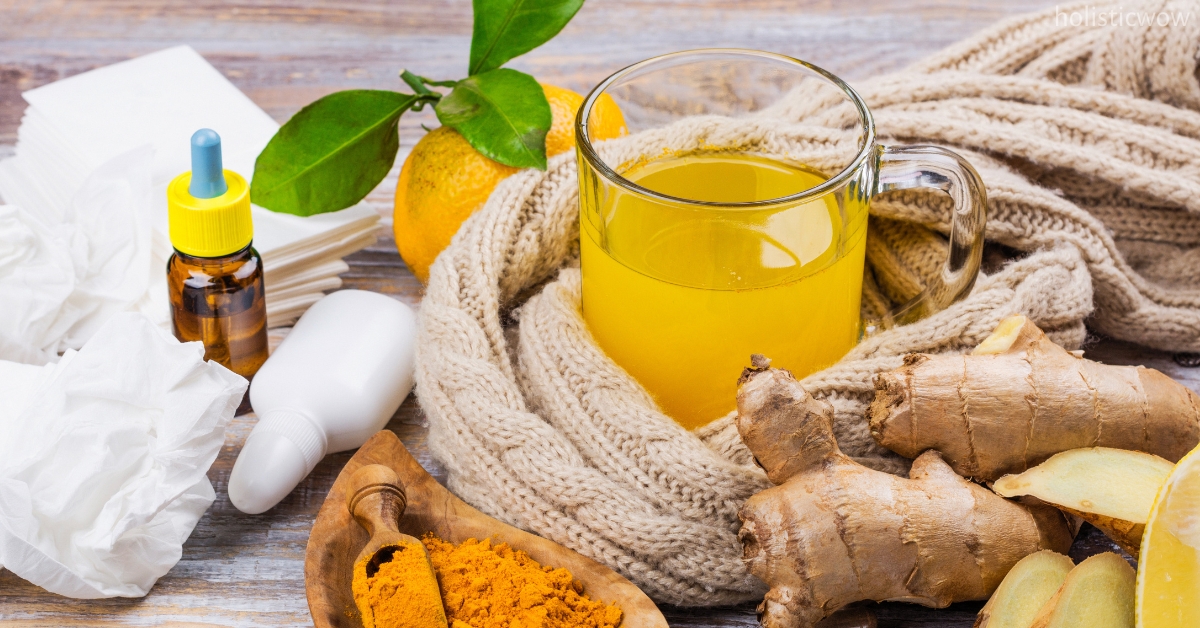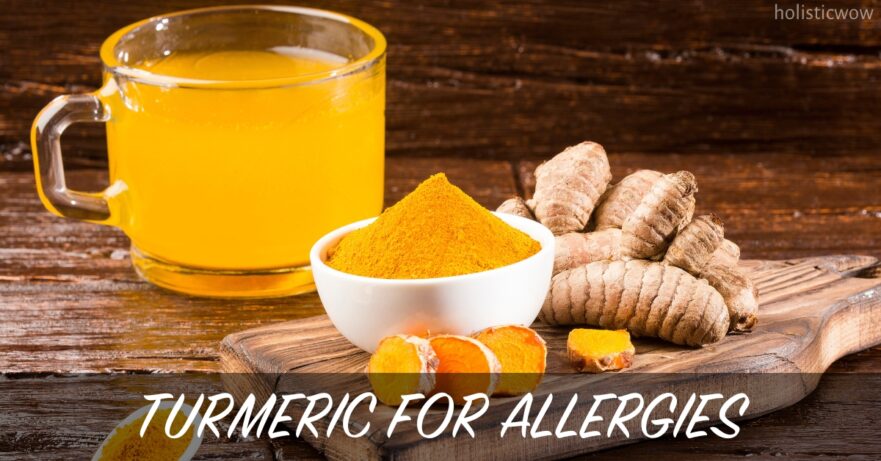Turmeric, particularly its active compound curcumin, has demonstrated several potential benefits for managing allergies.
Curcumin is known for its anti-inflammatory and antioxidant properties, which can help reduce inflammation associated with allergic reactions.
Additionally, curcumin has antiallergic effects by inhibiting histamine release from mast cells, which plays a key role in allergic responses. This action may help alleviate common allergy symptoms such as itching, swelling, and redness.
Another important factor is curcumin’s ability to modulate the immune system. Influencing immune function may help balance the body’s response to allergens, supporting overall immune health.
Some studies suggest that curcumin can suppress pro-inflammatory cytokines while enhancing the production of anti-inflammatory molecules, which may contribute to improved symptom management in conditions like allergic rhinitis.
Including turmeric in your diet, especially when combined with agents like piperine (found in black pepper) to enhance curcumin’s bioavailability, might benefit individuals experiencing allergies.
While turmeric is not a replacement for medical treatments, its natural properties may complement other strategies for improving well-being and relieving allergy-related discomfort.
What Are the Anti-Inflammatory Properties of Turmeric?
Turmeric contains curcumin, a natural compound recognized for its potent anti-inflammatory properties.
Curcumin inhibits various inflammatory pathways in the body, which may contribute to reducing inflammation associated with conditions like allergies and asthma. Research suggests that curcumin can suppress the release of histamine from immune cells, a key driver of allergic reactions, and modulate immune responses to reduce symptoms.
This anti-inflammatory effect is particularly important in managing allergic reactions, as inflammation plays a central role in how the body responds to allergens. By decreasing inflammation, turmeric might help alleviate symptoms such as sneezing, nasal congestion, and airway irritation, which are common in allergic diseases and asthma.
Is Turmeric a Natural Antihistamine?
Turmeric, a spice widely known for its health benefits, contains curcumin, an active compound that has demonstrated potential as a natural antihistamine.
Research suggests that curcumin has antiallergic properties and can inhibit histamine release from mast cells. This action may help reduce symptoms associated with allergic reactions, such as itching and swelling.
Additionally, curcumin’s ability to modulate immune responses and reduce inflammation may further support its role in managing allergies. While turmeric shows promise as a natural way to address allergic reactions, its effectiveness in humans is still under investigation.
How Does Curcumin Affect Allergic Responses?
Studies have shown that curcumin reduces allergic responses by inhibiting histamine release from mast cells. Histamine plays a key role in triggering allergy symptoms. This action may reduce the severity of allergic reactions and associated inflammation.
Research suggests that curcumin modulates the immune response, which may help alleviate symptoms like nasal congestion and sneezing. Studies in animal models and clinical trials have shown that curcumin can improve nasal airflow and reduce symptoms such as sneezing and rhinorrhea.
These effects are thought to result from curcumin’s ability to suppress pro-inflammatory molecules while enhancing anti-inflammatory ones, such as IL-10.
Additionally, curcumin appears to influence immune cells, including regulatory T cells (Tregs) and TH17 cells, which are involved in maintaining immune balance. By promoting anti-inflammatory effects and restoring immune regulation, curcumin may relieve symptoms in allergic conditions.
However, while these findings are promising, more research is needed to fully understand curcumin’s role in managing allergies in humans.

What Is the Role of Curcumin in Reducing Histamine Release?
Curcumin may play a significant role in reducing histamine release from mast cells. Mast cells are immune cells that release histamine, a chemical responsible for triggering allergy symptoms such as itching, swelling, and redness.
By inhibiting histamine release, curcumin could potentially help alleviate these symptoms and reduce the impact of allergens.
This action suggests that curcumin may support the management of allergy symptoms by modulating immune responses.
Research indicates that curcumin’s anti-inflammatory and immunomodulatory properties contribute to its ability to reduce the severity of allergic responses. While these findings are promising, further studies are needed to confirm its effectiveness in humans and to explore ways to enhance its bioavailability for therapeutic use.
Can Turmeric Help with Seasonal Allergies?
Turmeric may help with seasonal allergies due to its potential anti-inflammatory and immunomodulatory properties.
Curcumin has been shown to inhibit histamine release and reduce inflammation, both of which contribute to seasonal allergy symptoms.
Research suggests that curcumin may help alleviate common allergy symptoms such as sneezing, runny nose, and nasal congestion by improving nasal airflow and modulating immune responses.
While some studies indicate that curcumin may significantly reduce these symptoms, larger-scale human studies are needed to confirm its effectiveness, and individual responses may vary.
For example, one clinical trial found that curcumin helped suppress pro-inflammatory markers and enhanced anti-inflammatory responses, which could contribute to symptom relief. However, more research is needed to confirm its effectiveness and determine the best ways to use it for managing seasonal allergies.
Should You Use Turmeric for Asthma and Respiratory Disorders?
Turmeric, particularly its active compound curcumin, has traditionally been used to support respiratory health, including asthma.
Curcumin is known for its anti-inflammatory and immunomodulatory properties, which may help reduce airway inflammation and alleviate some symptoms of respiratory disorders.
Research suggests that curcumin may modulate immune responses and inhibit the release of histamine, which is involved in allergic reactions and asthma symptoms.
However, while turmeric shows promise as a complementary approach, it is not a substitute for prescribed asthma treatments or other medical therapies.
If you are considering using turmeric or curcumin to manage your asthma or respiratory disorder, you must consult a healthcare professional first. They can help determine whether the treatment is appropriate for your condition and ensure it does not interfere with your current treatment plan.

What Are the Dietary Benefits of Including Turmeric for Allergies?
Including turmeric in your diet may offer several benefits for managing allergies.
Turmeric contains curcumin, an active compound with well-documented anti-inflammatory and antioxidative properties.
These properties can support immune function and may help reduce the severity of allergic reactions, making turmeric a potentially valuable addition to a balanced diet for individuals with allergies.
Research suggests that curcumin may inhibit the release of histamine from mast cells, a key process in allergic responses.
Additionally, it has been shown to modulate immune activity by reducing pro-inflammatory markers and enhancing anti-inflammatory responses, such as increasing IL-10 production.
These effects may help alleviate symptoms such as sneezing, nasal congestion, and runny nose, which are common in conditions like allergic rhinitis.
Turmeric may contribute to overall health and well-being by promoting immune support and reducing inflammation.
While more research is needed to confirm its full benefits in humans, incorporating turmeric into your diet, especially when paired with black pepper to enhance curcumin’s bioavailability, could be a simple and natural way to support allergy management and improve quality of life.

How Can Turmeric Be Consumed to Alleviate Allergy Symptoms?
Turmeric, a spice known for its potential health benefits, may help alleviate allergy symptoms due to its active compound, curcumin, which has anti-inflammatory and immunomodulatory properties.
Here are some effective consumption methods to incorporate turmeric into your diet as part of a potential dietary treatment for allergies:
- Add turmeric as a spice to meals such as soups, stir-fries, or curries. This is an easy way to enjoy its flavor while potentially supporting your immune system.
- Take turmeric supplements in capsule or tincture form. These provide a concentrated dose of curcumin, but it’s important to choose supplements that include bioavailability enhancers like piperine (found in black pepper) to improve absorption.
- Enjoy turmeric tea by steeping turmeric powder or fresh turmeric root in hot water. Adding a pinch of black pepper and a squeeze of lemon can enhance curcumin’s flavor and absorption.
These methods allow you to incorporate turmeric into your daily routine while potentially reducing allergy symptoms such as sneezing, nasal congestion, and runny nose.
Does Combining Turmeric with Black Pepper Improve Its Effectiveness?
Yes, combining turmeric with black pepper significantly enhances its effectiveness.
Black pepper contains piperine, a compound that increases the body’s absorption of curcumin. Studies indicate that piperine can enhance curcumin’s bioavailability by up to 2000%, making it more potent in its anti-inflammatory and antioxidative benefits.
Combining turmeric and black pepper can improve curcumin absorption and maximize its potential for managing allergies, reducing inflammation, and supporting immune function.
Whether consumed in meals, supplements, or teas, adding black pepper to turmeric can help unlock its full therapeutic potential.
Herbal Preparations and Recipes for Allergies
Herbal remedies may help manage allergy symptoms by utilizing certain herbs’ anti-inflammatory and antihistamine properties. Turmeric, particularly its active component curcumin, may play a role in reducing inflammation and histamine release.
The following recipes incorporate turmeric to support your body’s natural ability to alleviate allergy symptoms. Always consult a healthcare provider before starting any new herbal regimen, as interactions with medications and pre-existing conditions may occur.
Soothing Turmeric Tea
Ingredients:
- 1 teaspoon turmeric powder
- 1 cup of boiling water
- Optional: honey, lemon, or a pinch of black pepper for enhanced absorption
Preparation:
- Add turmeric powder to a cup of boiling water.
- Stir well and let it steep for 10 minutes.
- Strain if desired, and add honey, lemon, or black pepper for flavor and better absorption.
- Drink 1-2 cups daily to help alleviate allergy symptoms.
This simple tea harnesses turmeric’s anti-inflammatory properties, and adding black pepper can enhance curcumin absorption. Thus, it can be a beneficial addition to your daily routine for managing allergies.
Warnings: Turmeric may interact with blood thinners and certain medications. Consult a healthcare provider if you are taking medication or have health conditions.
Allergy Relief Herbal Blend
Ingredients:
- ½ teaspoon turmeric powder
- ½ teaspoon dried nettle leaf
- ½ teaspoon dried chamomile flowers
- ½ teaspoon dried peppermint leaves
- 1 cup of boiling water
Preparation:
- Combine all the herbs in a teapot.
- Pour boiling water over the mixture and steep for 15 minutes.
- Strain and drink 1 cup 2-3 times daily.
This herbal blend combines turmeric’s anti-inflammatory effects with nettle’s potential antihistamine properties and the soothing qualities of chamomile and peppermint. Nettle contains bioactive compounds that may help block histamine receptors, reducing allergic responses. Together, these herbs may help alleviate allergy symptoms and promote overall well-being.
Warnings: Nettle may interact with blood pressure and blood sugar medications; consult a healthcare provider if you have underlying conditions. Chamomile may cause allergic reactions in individuals sensitive to ragweed and related plants.
These herbal preparations may support allergy management naturally. However, they are not a substitute for conventional medical treatment. Always consult a healthcare provider before incorporating new herbs into your routine, especially if you have existing health conditions or are taking medications.

